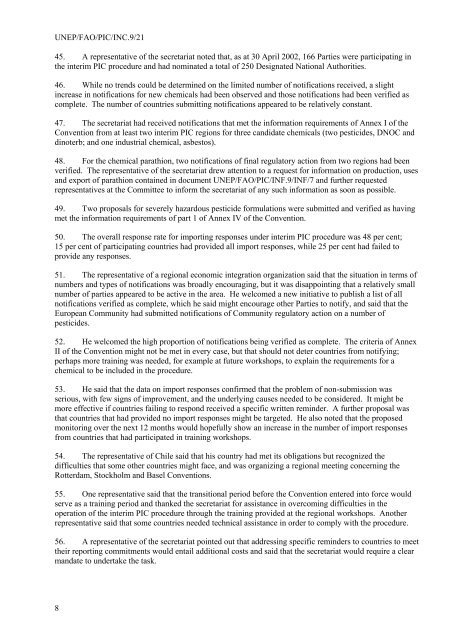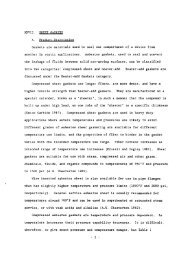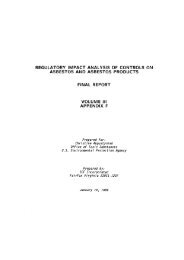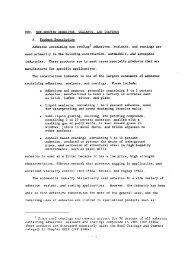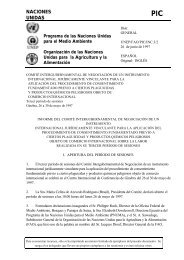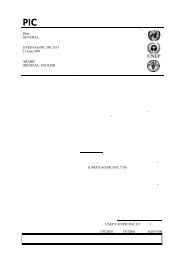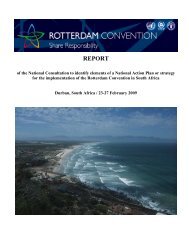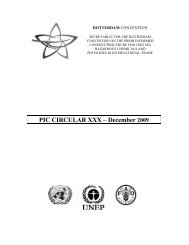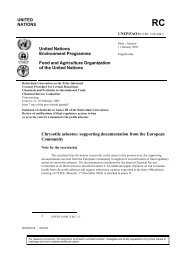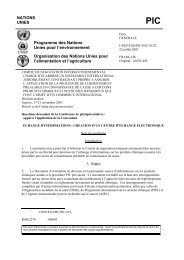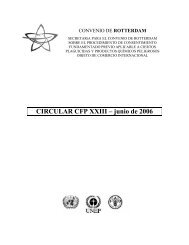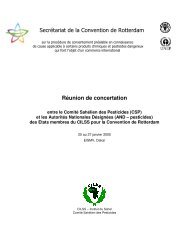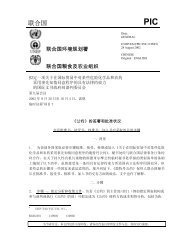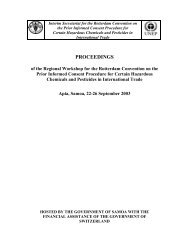INC9 REPORT.pdf - Rotterdam Convention
INC9 REPORT.pdf - Rotterdam Convention
INC9 REPORT.pdf - Rotterdam Convention
You also want an ePaper? Increase the reach of your titles
YUMPU automatically turns print PDFs into web optimized ePapers that Google loves.
UNEP/FAO/PIC/INC.9/21<br />
45. A representative of the secretariat noted that, as at 30 April 2002, 166 Parties were participating in<br />
the interim PIC procedure and had nominated a total of 250 Designated National Authorities.<br />
46. While no trends could be determined on the limited number of notifications received, a slight<br />
increase in notifications for new chemicals had been observed and those notifications had been verified as<br />
complete. The number of countries submitting notifications appeared to be relatively constant.<br />
47. The secretariat had received notifications that met the information requirements of Annex I of the<br />
<strong>Convention</strong> from at least two interim PIC regions for three candidate chemicals (two pesticides, DNOC and<br />
dinoterb; and one industrial chemical, asbestos).<br />
48. For the chemical parathion, two notifications of final regulatory action from two regions had been<br />
verified. The representative of the secretariat drew attention to a request for information on production, uses<br />
and export of parathion contained in document UNEP/FAO/PIC/INF.9/INF/7 and further requested<br />
representatives at the Committee to inform the secretariat of any such information as soon as possible.<br />
49. Two proposals for severely hazardous pesticide formulations were submitted and verified as having<br />
met the information requirements of part 1 of Annex IV of the <strong>Convention</strong>.<br />
50. The overall response rate for importing responses under interim PIC procedure was 48 per cent;<br />
15 per cent of participating countries had provided all import responses, while 25 per cent had failed to<br />
provide any responses.<br />
51. The representative of a regional economic integration organization said that the situation in terms of<br />
numbers and types of notifications was broadly encouraging, but it was disappointing that a relatively small<br />
number of parties appeared to be active in the area. He welcomed a new initiative to publish a list of all<br />
notifications verified as complete, which he said might encourage other Parties to notify, and said that the<br />
European Community had submitted notifications of Community regulatory action on a number of<br />
pesticides.<br />
52. He welcomed the high proportion of notifications being verified as complete. The criteria of Annex<br />
II of the <strong>Convention</strong> might not be met in every case, but that should not deter countries from notifying;<br />
perhaps more training was needed, for example at future workshops, to explain the requirements for a<br />
chemical to be included in the procedure.<br />
53. He said that the data on import responses confirmed that the problem of non-submission was<br />
serious, with few signs of improvement, and the underlying causes needed to be considered. It might be<br />
more effective if countries failing to respond received a specific written reminder. A further proposal was<br />
that countries that had provided no import responses might be targeted. He also noted that the proposed<br />
monitoring over the next 12 months would hopefully show an increase in the number of import responses<br />
from countries that had participated in training workshops.<br />
54. The representative of Chile said that his country had met its obligations but recognized the<br />
difficulties that some other countries might face, and was organizing a regional meeting concerning the<br />
<strong>Rotterdam</strong>, Stockholm and Basel <strong>Convention</strong>s.<br />
55. One representative said that the transitional period before the <strong>Convention</strong> entered into force would<br />
serve as a training period and thanked the secretariat for assistance in overcoming difficulties in the<br />
operation of the interim PIC procedure through the training provided at the regional workshops. Another<br />
representative said that some countries needed technical assistance in order to comply with the procedure.<br />
56. A representative of the secretariat pointed out that addressing specific reminders to countries to meet<br />
their reporting commitments would entail additional costs and said that the secretariat would require a clear<br />
mandate to undertake the task.<br />
8


